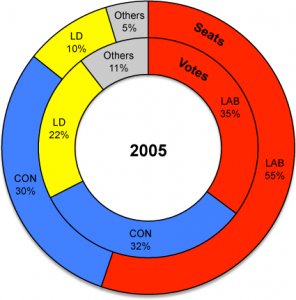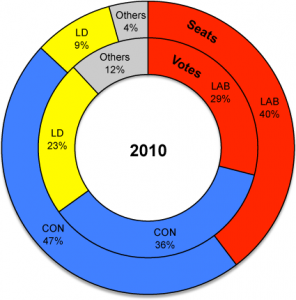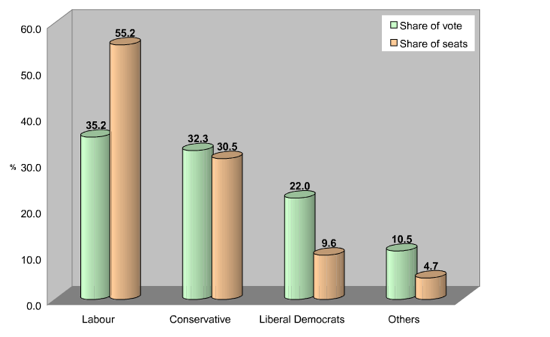
The Dear Leader, Gordon Brown, has finally been forced to called a General Election for Thursday 6th May. How fortunate for him that the pesky national rail strike that was to go ahead this week was stopped by the high court at the the last possible minute, that would have been terribly embarrassing for him to have to announce a General Election on a day when nobody could get work wouldn’t it?
Regardless, let’s get down to business. This general election is the most long awaited election in recent history, although the really delicious irony is that if Gordon Brown had done what he should have done and called a General Election as soon as he became our un-elected Prime Minister, the popularity of both himself and his wretched party at the time would have meant that we would at this point still be waiting for another two years for it. Crisis averted, nonetheless, even if the aversion did come about because of a grotesque disregard for democracy. And please don’t give me that crap about “you vote for the party, not the man“, everyone knows that’s not how it really works.
 It should come as no surprise to anybody that I intend to vote for the Conservatives on May 6th. I have never voted Labour nor will I ever vote Labour. Because of this I have never enjoyed life under a government that I have voted for, since the first General Election that I was eligible to vote in was in 1997, when this disaster of a government first came to power. This is why I have complained so vociferously about the government for so many years – I have a personal belief that people should not have the right to complain about a government that they themselves voted in. You made your bed, now you have to lie in it. The same will apply to me should the Conservatives win this election. Remember this at the polling booth if you want me to shut up for the next 4-5 years, that in itself should be incentive enough for anyone to vote Tory :)
It should come as no surprise to anybody that I intend to vote for the Conservatives on May 6th. I have never voted Labour nor will I ever vote Labour. Because of this I have never enjoyed life under a government that I have voted for, since the first General Election that I was eligible to vote in was in 1997, when this disaster of a government first came to power. This is why I have complained so vociferously about the government for so many years – I have a personal belief that people should not have the right to complain about a government that they themselves voted in. You made your bed, now you have to lie in it. The same will apply to me should the Conservatives win this election. Remember this at the polling booth if you want me to shut up for the next 4-5 years, that in itself should be incentive enough for anyone to vote Tory :)
There’s a number of issues and reasons to discuss as to why I am going to vote Conservative. It’s not all to do with class background and upbringing, and even if it was Labour voters are more guilty of habitual voting than any other section of the electorate. All this “me Dad voted Lairbuh, an’is Dad voted Lairbuh, an’is Dad went on’t Jarrow March, so ah’ll vote Lairbuh an’all” bullshit and the more modern “OMG! The evil Tories!!!1” hysterical nonsense that is so widespread on social networking sites frustrates the living hell out of me and so I won’t condone it for any party’s supporters. Everybody should by now know that no party is like what it used to be, especially not Labour who were willing to go as far to admit it with their “New” party name in 1997 and their new centre-left position meant that they won. Had they stuck to their irrelevant and outdated “old Labour” values they would still be on the opposition benches where they belong.
Before I move on to specific election issues I would like underline the importance of everyone who is eligible to vote to do so, even if you don’t want to vote for any of the available candidates and you spoil your voting card. It should be mandatory to vote (or spoil) with a stiff financial penalty for anyone who doesn’t. You don’t get to do this very often and so everybody should make the most of it when they do. It is also critically important for voters in marginal seats to make sure that they vote. Remember that under currency constituency boundary arrangements, recently revised or not, it is much much easier for Labour to win seats than it is any other party, so if you don’t want another Labour government make sure you get off your arse.
Here is reminder of the 2005 election results from my blog posted after the last General Election, where Labour only had to secure 35% of the vote in order to secure 55% of seats, thereby providing them with the majority they needed for a third term of government. How, exactly, is this fair?
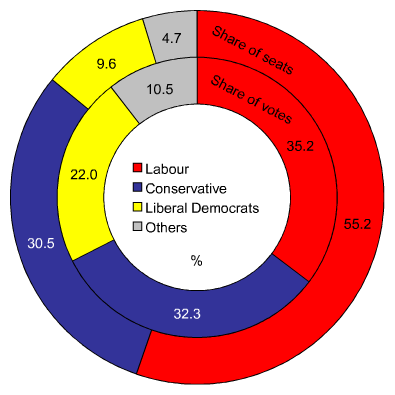
The travesty of democracy that were the 2005 General Election results
I’ve been told that since the last election constituency boundaries have been revised, but I’ll wager anything that they haven’t been revised all that much, and certainly not to the extent where it’s now a level playing field for all parties. Indeed, constituency boundaries are not the only reasons why the system is stacked in Labour’s favour.
Now on to the specific issues, which are both important to me and most of which should be important to everyone else:
Labour’s “performance” over the past 13 years
Labour’s election pledges, whilst not only being as generic and vague as election pledges could possibly be (in order that their eventual implementation can mean as many things as possible), also read like they’re from a party in opposition that’s trying to oust a longstanding and hated incumbent government, and not from a party that’s already been in power for three terms and thirteen years. Thirteen years is more than enough time for any government to achieve what it promised to achieve since coming to power and despite this Labour still blame the majority of their woes on the previous Conservative government. Are they going to do that forever? I thought they were supposed to fix everything the evil Tories did wrong? Just how long am I being expected to wait?
The fact is that Labour have performed abysmally since coming to power on so many fronts. You’ll note that I’ve not said “all fronts”, because that would be untrue and unfair, but it is true and fair to say that their failures vastly outweigh their successes. You’d have to be a real idiot not to realise that. They’ve had their chance, and for the most part they’ve fluffed it, in some cases to a degree that we simply couldn’t have imagined only a few years ago. I am not prepared to give them five more years in which to continue to cock things up, frankly, and anybody who is willing to grant them this really needs their head examined.
When reading this blog post I expect Labour supporters to be thinking “ah yes, but Labour have said they will do $whatever on this issue, which is better than what the evil Tories are proposing“. The fact is that I simply do not believe them because of their recent (and indeed not so recent) record. The Labour election manifesto is nothing more than toilet paper to me, it may as well be blank. Indeed, it would actually be more credible and believable if it was blank.
Economy
This really is the single most important issue that practically everyone is talking about during this campaign, and quite rightly so. If you’re not aware that Labour have left us with a £167,000,000,000 national deficit as a result of their fiscal policies, rampant public spending and government waste then you really have been living under a rock for the past few years and need to wake up and smell the coffee. It’s going to be one bastard of a hangover to shift. The trouble is that Labour don’t seem to want to start the process of shifting it, they just want to continue drinking, thus making the problem worse and worse. Their performance and broken promises on the economy since coming to power have destroyed any credibility they ever had on the subject and we are once again left with a country on the verge of bankruptcy after the biggest boom and the biggest bust since the second world war, something which Labour explicitly said they would prevent from happening in their 1997 manifesto. They simply cannot be trusted to fix something which they were so instrumental in causing in the first place.
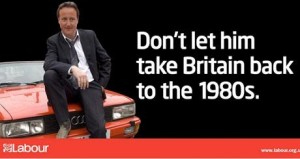
The 1980s were better than the 1970s.
The country’s financial position coupled with the recent industrial unrest (public sector, British Airways and (cynically blocked) national rail strikes) is horrifically reminiscent of the dying days of the pathetic Labour government in 1979 who were as desperate to cling on to power then as they are now. Labour will always be the same and they will never learn from their mistakes. Labour recently tried to scare everybody by saying that if the Tories won the election they would take Britain back to the 1980s. If this is the case then bring it on, the 1980s were a prosperous decade and a darn sight better than the disaster of the 1970s, which is what Labour have taken us back to.
Public spending, non-jobs and waste
Since coming to power, 66% of new jobs created in the United Kingdom have been public sector jobs, all funded by the taxpayer with an ever increasing tax bill from Labour which has by now doubled the UK’s tax burden since 1997. This is absolutely shocking. You cannot improve the economy of a country by expanding its state. Not only is that a rocky road to out and out communism but it is also a fiscal lie. Only wealth-creating private sector jobs can improve the economic performance of a nation. This is pretty basic economics and yet something which our glorious Prime Minister and chancellor of ten years apparently doesn’t understand since he is so insistent on increasing the “employment tax” that is employers’ National Insurance, presumably to pay for even more public sector jobs that we don’t need.
For a concise list of other ways in which this government wantonly squanders hard earned money from tax payers, even ignoring the giant welfare bill (which, incidentally, is greater each year than the total receipts from income tax), I draw your attention to the Department of Government Waste, a parody site set up by the Conservatives but which is based on real facts. The full list is in their downloadable PDF.
The Conservatives, however, have made it very clear that further tax hikes are not the way to go and cutting government waste is a high priority for them. I simply do not understand how anybody can say that this is a bad idea. Indeed it may lead to some public sector job losses, but boo hoo, they can join the real world for a change and put up with the risks of working in the private sector instead of wasting public money in public sector fantasy land, where nobody ever gets sacked no matter how bad they are at their job and everybody gets a nice fat index-linked pension at the end of it. It’s that which we can no longer afford, not scrapping the endless tax rises that Labour have relentlessly subjected us to for 13 years despite their early promises not to do so.
Lesbian, gay, bi-sexual and transgender (LGBT) issues
This, I will admit, is a thorny issue with the Conservatives and we as a minority have much to be thankful for to Labour. This is an area in which they have actually significantly delivered on their original manifesto. They have delivered greater equality legislation to everyone with alternative sexualities and they have delivered civil partnerships and adoption rights to homosexual and bi-sexual couples. I’m not for one second going to refuse credit where credit is due on this.
One could argue, however, that such legislation would eventually happen, Labour government or no Labour government. I think it’s probably fair to say that it would have taken a bit longer under a Conservative government, but I do believe that we would still have it by now and it would be a case of better late than never. I also do not believe for one minute that a new Tory government would even dream of taking any of it away from us.
However, what I do know for sure is that we now do have what we asked for. The job’s done, complete and delivered. But I missed the part of the legislation that means that I as a gay man am obliged to reward Labour for what they have done by only ever voting for them and never for the “evil Tories”. Indeed, I’ll go as far as to say that I’m under absolutely no obligation to do so whatsoever. Labour have come good in one specific area and done extraordinarily badly in most others. Our wonderful new legislation has quite the price tag attached to it when you consider all the crap that’s been associated with the party that brought it to us. Many may question whether it was actually worth it all things considered.
The Conservatives have a questionable history when it comes to gay rights, no doubt, and it would seem that they still do have a few bad apples, with Chris Grayling being the most notorious example at the moment. David Cameron missed a beat this week when he didn’t fire him for his comments about bed and breakfast owners and I am disappointed about this (although Grayling has since admitted that he was wrong to say what he did), but it’s still not a reason to condemn a whole party to opposition forever. Indeed, anybody who votes for or against a particular party based on one single issue is both selfish and shortsighted.
I’m also quite sick of being asked “but how can you be gay and Tory?“. Get a grip, the two aren’t by any means mutually exclusive. Think back to when you were asked “but how can you like boys when you yourself are a boy?“. It’s as annoying, ignorant and insulting as that, so my advice to you is to grow up and get the fuck over it, because I am most certainly not the only “gay Tory” (if I have to accept a label) out there. Indeed a recent poll for Pinknews.co.uk recorded 25% of those asked as supporting the Conservatives, with 25% supporting the Liberal Democrats and 28% supporting Labour. Please don’t try and tell me that gay Tory voters are in a tiny minority.
Education
Although I am aware that primary and secondary school education has suffered somewhat under Labour neither will be the focus of this section because I do not know the specific facts. All I do know is that school leavers these days, now having the benefit of an entire education under Labour, seem to be barely literate and for the most part unfit to enter the world of work. Major business leaders have specifically complained about this and I really feel sorry for the poor buggers who’ve had Labour’s dumbed-down education system forced upon them.
Yet despite this more and more of them are entering higher education thanks to Labour’s unnecessary and seemingly arbitrary target of sending 50% of school leavers to university. For no reason. The country wasn’t short of graduates before or anything, Labour just didn’t think it was fair that some people were graduates whilst many weren’t. It just wasn’t socialism. As a result we have a massive over-supply of mediocre graduates with Mickey Mouse degrees believing that it entitles them to a better job, which of course it doesn’t since employers have simply upped their qualification requirements to compensate. What Labour have done isn’t fair on anybody, least of all the students themselves.
Now, all this would be slightly less baffling if at the same time Labour hadn’t completely ridden roughshod over student and university funding since 1997. The National Union of Students (NUS) campaigned vociferously on behalf of their members (whether their members liked it or not) in 1997 to get Labour elected, and what have Labour done for them since? They’ve abolished student grants (within mere months of coming to power), increased tuition fees and cut university funding – at the same time as trying to get even more people to become students in the first place. What the bloody hell is that all about then? I hope that the NUS are proud of themselves, frankly.
Crime and punishment
The statistics will show that under Labour crime has fallen and continues to fall, but I do not for one minute believe that it is as clear cut as that. Everybody knows that statistics can be manipulated and that Labour are the grand masters at doing it. Indeed, Gordon Brown himself was caught out less than three times in March of this year alone for mis-representing statistics, which eventually lead to a telling off from the Office of National Statistics [letter] . There will always be a vast difference between reported and un-reported crime and it’s also important to remember that not all types of crime are equal. Some types of crime are more serious than others and affect real people in real ways, such as violent crime and burglary, rather than comparatively more victimless crimes such as insurance fraud and so on.
The police forces are bogged down with a target-driven culture imposed on them by Labour and spend inordinate amounts of time on paperwork even for trivial matters, in contrast to Labour’s (since disproven) claims that police officers spend 80% of their time on the beat (where “the beat” is also some contrived new-Labour definition of the beat and not what you or I fondly remember). Labour have introduced Police Community Support Officers which are nice to see around and about on the street but they have no more powers than a traffic warden did back in the day, and we don’t have any proper traffic wardens now, just Parking Enforcement Officers with even less powers. It’s not all about the number of bums on seats, we need the right bums on the right seats.
We need to move away from the ridiculous culture where criminals have more rights than victims and make sure that anyone acting reasonably to stop a crime or apprehend a criminal is not arrested or prosecuted, as well as or instead of the criminal which seems to happen over and over again since it’s easier to hit your Labour-dictated targets but arresting and processing the “soft option” member of the public who thought he was only doing his civil duty rather than the “I know my rights, mate” criminal who’ll likely get away with it and thus deny your a target point. If anybody should be defining targets for the police force it should be the public, not politicians.
Immigration
Labour have completely lost control of immigration into this country. The immigration “system” is nothing but a complete farce that is exploited and abused by thousands of people every year. Labour have proven themselves to be unable and/or unwilling to do anything about it (unwilling, perhaps, because immigrants typically end up voting Labour should they eventually bother to obtain the right to vote). The trouble is that anyone who is willing to speak out against immigration is immediately labelled a racist by hysterical politically correct left wingers whose priority is to simper and wring their hands in order to make sure that the needs and demands of immigrants come above the needs of established citizens of this country. This really has to stop and people need to get a fucking grip.
We all know the facts when it comes to migrants who want to come to this country. Few are actually in genuine need of asylum, most are economic migrants. Even those who claim asylum are on shaky ground since if you are in a position where you need to claim asylum you are supposed to claim it in the nearest country that is qualified to afford it to you, which includes all the EU countries that you have to travel through in order to reach the UK. There is only one reason why this otherwise unremarkable nation is singled out in such a way and that is our monstrously generation welfare state. I know it, you know it.
I’ve a long list of things that I think need to be done about this. I don’t think any of them are unreasonable. The Conservatives only really cover two of them – only admitting migrants that will “benefit the economy” and offering English language instruction, and even with the latter I think it should be a requirement rather than something that is merely offered. No party goes far enough to tackle the immigration problems in their manifesto, no party would even dare given the ridiculous hysteria that is whipped up every time this emotive issue is mentioned.
It would do us all a lot of good, and I can’t believe that I’m about to say this given my general position on Europe, if rules on immigration and asylum were unified across all European countries. For example, in France new migrants are entitled to no benefits whatsoever; they have to have lived and paid tax in that country for a number of years before becoming entitled to them. In Germany asylum claimants are all kept in holding centres until their claims are processed, at which point they are either allowed into the country or sent directly back to where they came from. You won’t find any failed asylum seekers living illegally in Germany. We get it wrong in every way imaginable.
Make no mistake, this isn’t about not liking people with brown skin, far from it. There are plenty of hard working people in this country with brown skin, many having been here for generations and multiculturalism is in general a good thing. This is about people with skins of all possible colours abusing a weak and exploitable system and then living off those very same hard working people. It isn’t acceptable and we can’t afford it. Britain is a soft-touch when it comes to immigration and this is well known in countries from where most of the immigrants come from. Migration to Britain is even packaged up and sold as one-way tours by foreign firms.
I’ll stop here with this issue because I really could go on forever and it would probably be racist or something.
Labour lies, sleaze and arrogance
Finally I would like to remind everyone that one of Labour’s major election pledges in 1997 was that they were going to be whiter than white, in contrast to the “sleaze-ridden” Tories of the time. I’m sure I don’t need to remind everyone of John Prescott’s now infamous speech on the subject. Since then Labour have proven themselves time and time again to be more arrogant and sleaze-infested than the Tories could ever have even dreamed of being.
In May 1997, Blair promised his government would be purer than pure as an antidote to the Tories’ sleaze. Within months, Formula 1 racing owner Bernie Ecclestone had won an exemption from tobacco advertising after donating £1m to Labour. Every week there seems to be a scandal of sort involving a Labour MP or someone who works for the Labour government, including the recent revelation of high profile Labour MPs pimping themselves out for thousands per day. Whether the Tories will be any better remains to be seen, but they surely can’t be any worse than this shower.
Regardless, it’s by no means something that Labour can now campaign on and is indeed something they should not have campaigned on in the first place given their record. Instead of the fair and honest party they promised they would be we have an arrogant, desperate incumbent government that will not admit its mistakes, puts itself first and will do anything to cling to power. To hell with everyone else and their interests. These are not the actions of a “party of the people”.
That’s it for specific issues. There are of course numerous smaller issues, many of which are just as important, but I have to draw the line with this blog post somewhere.
This will in all likelihood be the only major blog about the election that I post before the election itself on Thursday 6th May because I wanted to get all my rants into one blog and out of the way as early as possible into the campaign. I will however be posting a significant election blog in the week or so after the election, whichever way it goes. Until then I will of course be ranting daily about election related matters on Twitter and Facebook. On Twitter I tag election-related posts with the hashtags #ukelection and/or #labourfail when space permits (click on either to search for my tweets that have those hashtags). More or less everything I post to Twitter then gets automatically posted to my Facebook profile, which can only be viewed if you are a friend on Facebook.
All three main parties have published their full manifestos online, but I have provided links to them here:

